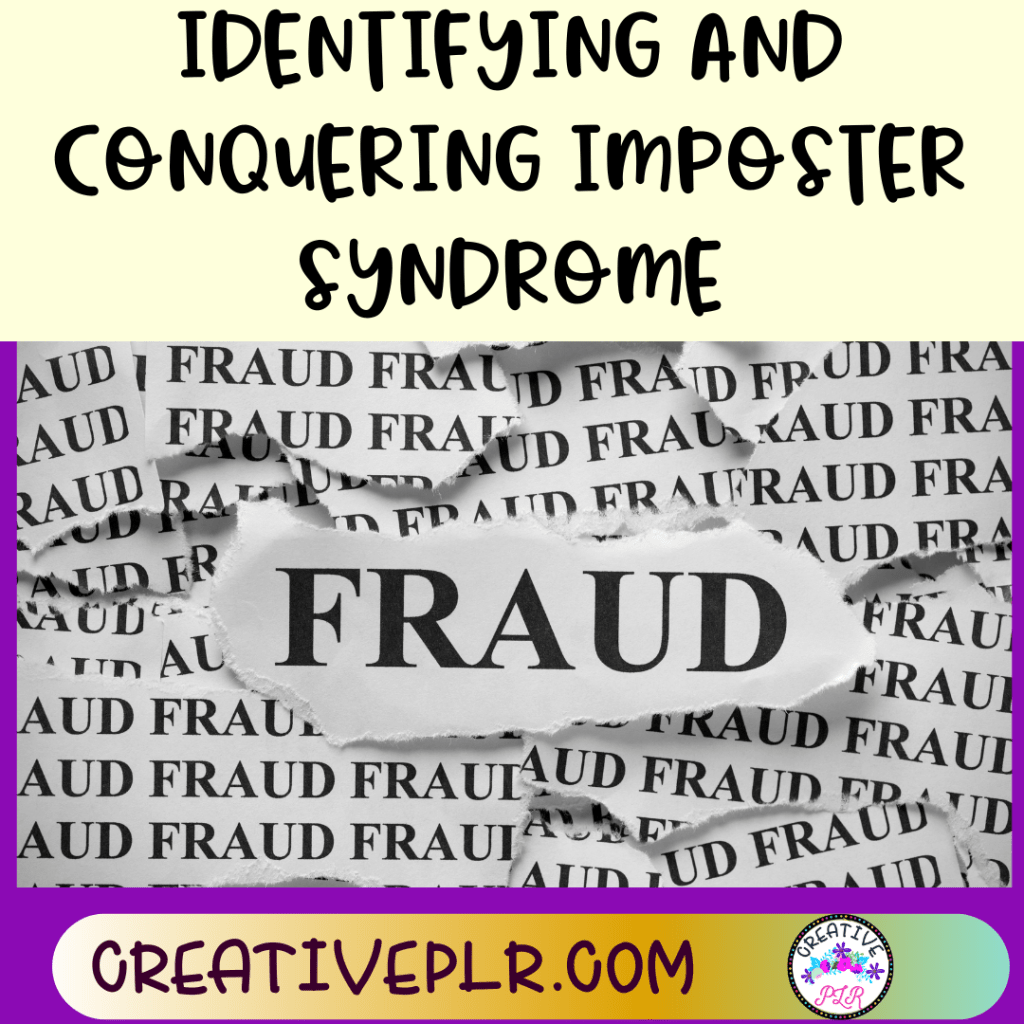Imposter Syndrome is very common and affects individuals from all walks of life. It refers to a deep-rooted belief of not being worthy of one’s accomplishments, leading to self-doubt and a persistent fear of being exposed as a fraud. If you find yourself questioning your abilities and constantly downplaying your achievements, you may be experiencing imposter syndrome.

Identifying the Signs of Imposter Syndrome
Imposter syndrome can manifest in various ways, and individuals may experience different combinations of symptoms. Here are some common signs to look out for:
- Self-doubt: Persistent self-doubt about one’s abilities, accomplishments, or qualifications, despite evidence to the contrary.
- Attributing success to luck or external factors: Believing that any success or achievements are purely due to luck, timing, or other people’s assistance rather than acknowledging one’s own competence and hard work.
- Fear of being exposed as a fraud: Worrying that others will discover that you are not as competent or knowledgeable as they perceive you to be, and that you will be exposed as a fraud.
- Discounting achievements: Minimizing or downplaying personal achievements, dismissing them as insignificant or not worthy of recognition.
- Overachieving or perfectionism: Setting extremely high standards for oneself and striving for perfection in all areas, often fearing failure and feeling anxious about making mistakes.
- Constantly seeking validation: Seeking excessive external validation and approval from others to validate one’s worth and competence.
- Difficulty accepting compliments: Feeling uncomfortable or dismissing compliments, often attributing them to flattery or believing that others are mistaken in their positive assessments.
- Comparing oneself to others: Engaging in frequent comparisons with others and feeling inadequate or inferior based on perceived achievements or abilities of others.
- Fear of failure: Experiencing intense anxiety, fear, or self-imposed pressure when faced with new challenges or opportunities, anticipating failure and expecting to be exposed as inadequate.
- Overworking or overpreparing: Putting in excessive effort, working long hours, or overpreparing for tasks and projects in an attempt to compensate for perceived inadequacies.
- Emotional distress: Feeling stressed, anxious, or depressed due to the constant pressure to meet unrealistic standards and the fear of being discovered as an imposter.

It’s important to note that experiencing one or more of these signs does not necessarily mean that an individual has imposter syndrome. These are just some common signs and most of us experience one or more of these at times.
A study done by J. Sakulku and J.Alexander (2011) for the International Journal of Behavioral Science states that 70% of us experience some of these signs at some point. And if it is any comfort, those that experience it are intelligent and skilled people. Read that article HERE.
How Impostor Syndrome Negatively Affects Your Life
Impostor syndrome causes you to feel like you do not deserve a certain level of success. These thoughts can then begin a cycle of negative thoughts that lead to emotional distress. This can manifest itself in a variety of ways and for many reasons.
Since impostor syndrome is an internal thought process that bombards you with negative thoughts, it can directly affect your life in all areas. These areas include your home, work, family, health and relationships.

Since this can cause depression and anxiety, all areas of your life could suffer. You are less likely to want to be around others for fear of discovery. If people over-prepare, they believe their success is not a result of ability but because of hard work. And if they have procrastinated anywhere along the line, they believe success is due to luck.
Overcoming Imposter Syndrome
Now that you have identified the signs of imposter syndrome, it’s time to take control and overcome this self-doubt. Here are some strategies that can help:
1. Embrace self-awareness: Recognize that imposter syndrome is a common experience and that many successful individuals have faced similar feelings of self-doubt. Understand that your thoughts and feelings do not define your true capabilities.
2. Celebrate your achievements: Practice acknowledging and celebrating your accomplishments, no matter how small they may seem. Keep a record of your successes to remind yourself of your abilities during moments of self-doubt.
3. Change your self-talk: Challenge negative self-talk and replace it with positive affirmations. Remind yourself of your strengths, skills, and past successes. Focus on your progress rather than perfection.
4. Seek support: Share your feelings with trusted friends, family members, or mentors who can provide you with encouragement and perspective. Remember, you are not alone, and seeking support is a sign of strength, not weakness.

5. Embrace failure as a learning opportunity: Understand that failure is a natural part of growth and success. Instead of seeing failure as evidence of your incompetence, view it as a chance to learn, adapt, and improve.
6. Develop a growth mindset: Cultivate a belief in your ability to learn and grow. Embrace challenges and view them as opportunities for personal development. Emphasize effort and resilience rather than relying solely on innate talent.
7. Seek professional help if needed: If imposter syndrome significantly impacts your daily life and well-being, consider seeking support from a mental health professional who can provide guidance and strategies tailored to your specific situation.
By implementing these strategies and maintaining a positive mindset, you can gradually overcome imposter syndrome and regain confidence in your abilities.
Imposter syndrome can be a challenging mindset to overcome, but with self-awareness, support, and a shift in perspective, you can conquer self-doubt and embrace your true capabilities. Remember, you are not alone in experiencing these feelings, and by taking proactive steps, you can pave the way for personal and professional growth.
Did you recognize yourself in the signs? I know I often have several of those and as I have gotten older, I am more aware of my attitudes. Sometimes, negative self talk is our first sign. Journaling has helped express those feelings. And when we put things in writing,, it is easier to become objective about those negative thoughts.
For more self-help topics, check out FEAR OF SUCCESS and AVOIDING BURNOUT. I would love to hear your thoughts and see if Imposter Syndrome has impacted you or your business. Do you think it has held you back from achieving more? Drop a comment below or email me at [email protected].